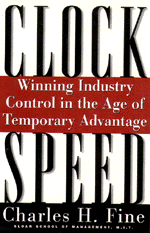|
| ||
 |
A Business Forum Book Review:
CLOCKSPEEED: Winning Industry Control in the Age of Temporary Advantage by Charles H. Fine (Perseus Books, 272 pages, US$25.00) offers exciting and well-documented case studies of noteworthy companies that have either thrived or failed in anticipating and adapting to rapid change. Perhaps most notorious, the IBM Corporation made a simple but fateful decision less than two decades ago that changed the course of the computer landscape.
Facing an urgency to deliver its new product -- the personal computer (PC) -- to the marketplace, IBM abandoned its core strategy of making its primary products inhouse; instead, it elected to outsource the principal components of the PC, including the operating system and the CPU. The company’s decision redefined the future PC industry. Rather than becoming a vertically integrated industry -- in which each computer manufacturer would design and control its proprietary technology -- the industry changed course assuming a horizontal structure; computer companies would now build compatible systems using industry-standard components.
Those critical components were the 8086 microprocessor and the MS-DOS operating system. From what appeared to be an uncelebrated corporate decision, two relatively obscure technology companies named Microsoft Corporation and Intel Corporation were to revolutionize this industry.
IBM's decision to accommodate industry-standard components would foster totally new competitors --Compaq Computer Corporation and Dell Computer Corporation, which would eventually rout IBM in the marketplace it had essentially created. Today’s 20/20 hindsight enables us to see that IBM made a cataclysmic mistake. Charles Fine reminds us that we have only recently recognized supply chain strategy as a critical component of marketplace success.
Professor Fine, Associate Director of the Center for Technology, Policy and Industrial Development, teaches in the operations management group at MIT's Sloan School of Management. He also serves as Director of the Technology Supply Chain project, Co-Director of MIT's International Motor Vehicle Program and Co-Director of the Fast and Flexible Manufacturing Project. Focusing on the imperative of concurrent design of products, processes and capabilities, he emphasizes that "a company’s real core capability -- the inner core, if you will -- lies in the ability to design and manage the supply chain in order to gain maximum advantage, albeit temporary, in a market where competitive forces may change at lightening speed."
The fabulously successful Dell Computer Corporation is designated by Charles Fine as "one of the most inspired supply chain designers on the planet." A breathtaking case study, Dell’s "primary advantage is its preeminent supply chain design, augmented with precise supply chain management ... driven by ‘vintage software’ for materials requirements planning (MRP)" throughout the 1990s. "The story of Dell’s success is fascinating and important, in part because it illustrates a brilliant supply chain design in a fast-clockspeed industry."
In this perceptive and constructive work, Professor Fine concludes "that the only lasting competency is the ability to continuously assess industrial and technological dynamics and build capability chains that exploit current opportunities and anticipate future ones. Among capabilities, this competency of selecting all others is not to be outsourced! ... In short, thinking is a core capability not to be outsourced. And the faster the clockspeed, the more frequent is the need to think and rethink."
Your comments and suggestions for these pages are most welcomed!
|
Email: [email protected]
227 Fuller Street |
URL: http://www.businessforum.com/clockspeeed.html
Revised: January 14, 2000 TAF
© Copyright 1998, 2000 Thomas A. Faulhaber / The Business Forum Online®, All Rights Reserved